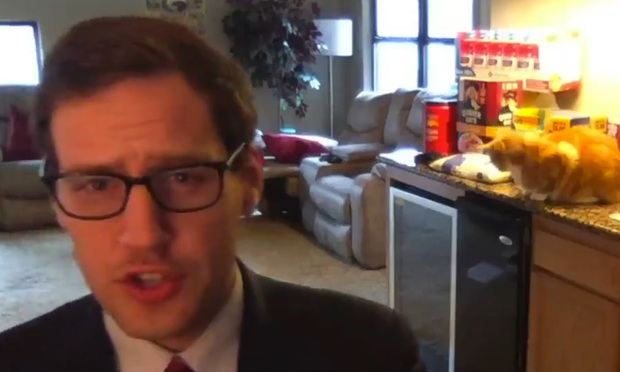With Law Students Jittery, Profs Try to Engage Them Online
From amusing lecture videos to daily video chats with the dean, law schools are scrambling to provide student support and foster interaction amid the quick shift to online classes.
March 19, 2020 at 01:29 PM
7 minute read
 Alex Nunn and his cat Bentley (Courtesy Photo)
Alex Nunn and his cat Bentley (Courtesy Photo)
Erwin Chemerinsky, dean of the University of California, Berkeley School of Law, has been holding a daily video chat this week for students, where they can ask questions about the school's rapid move to online teaching and hear the latest news from campus.
Kellye Testy, the president of the Law School Admission Council, starts each online session of the seminar on law and leadership that she's teaching as an adjunct this semester at Villanova University Charles Widger School of Law by asking her students how they are doing amid the coronavirus and social distancing before jumping into the class material.
And professors like Alex Nunn, at the University of Arkansas School of Law, are finding ways to make online lectures fun and engaging. Nunn's first online Criminal Procedure II lecture on plea bargaining—featuring an appearance by his cat Bentley—is winning praise on Twitter and legal blogs for its cleverness and energy. In fact, Nunn's lecture—which includes rock music over cheesy graphics—is so impressive that Hillary Clinton tweeted Wednesday that it's "the most groundbreaking Crim Pro I've seen since I taught it at Arkansas myself (during the late Middle Ages, after the bubonic plague and before the coronavirus)."
It's a brand new era for law schools as they navigate the transition from primarily brick-and-mortar institutions to those that function exclusively in the digital space. All 198 American Bar Association-accredited law schools have now canceled in-person classes and have moved courses online, or will do so in the coming weeks—some have already said they will remain online for the rest of the spring semester.
That means schools must quickly figure out how to keep students connected to their professors and classmates and provide student services and support in nontraditional ways. Many legal educators are looking for ways to reduce the anxiety and isolation their students are likely to feel as they stay indoors and attend classes remotely.
"It's a tough time for students," Nunn said in an interview Thursday. "Remove the coronavirus and going online, law school is already very stressful and a time of a lot of uncertainty for students. When you add those elements into the mix, things can be quite tricky. I'm being proactive about reaching out to my students and figuring out if there's anything we can do to ease their transition."
Part of that effort is making his online lectures as lively as possible—a strategy he employs in his classroom teaching as well. Nunn says watching dull online bar prep lectures gave him a clear vision of what he wanted to avoid in his newly online classes. (His second online lecture is a riff on Star Wars, with a timely rebrand as the Corona Wars.)
"When you are behind the camera—even more so than in the classroom—project energy and enthusiasm," Nunn said. "Students will take their lead from you, behind the screen. If you are looking like you are having fun, I figure that has a lingering effect in the students. My theory is that enthusiasm is contagious."
Other law professors have discovered that the widely used Zoom video conferencing platform enables them to change the background of their screen, allowing them to deliver a torts lecture in front of the Eiffel Tower, for instance, to add a small slice of levity to the situation.
Meanwhile, some schools are taking formal steps to reduce the pressures on their students this semester. A handful of elite law schools have already decided to embrace pass/fail grading for the spring semester, which was prompted in part by the desire to reduce the strain on students who are already facing unprecedented upheaval. (The security of exams delivered remotely is another factor in the move to pass/fail grading.)
Less formally, some schools such as U.C. Berkeley, are offering remote versions of the meditation and students wellness sessions that typically take place on campus. Schools are also highlighting access to counseling and advising sessions, all held via the Internet.
Opening her seminar with some time devoted to discussing the current situation is an opportunity for her students to interact with each other in a more personal way that just discussion class subjects, Testy said of her upper-level Villanova seminar, which has 20 students. It also highlights how varied their circumstances are. One student has been logging onto class from the beach, while others are taking care of children or elderly family members.
"Some of them are pretty isolated, and I think they just were so happy to connect with me," Testy said. "My students are third years and are doing OK. The 1Ls, I think, are the ones having a harder time."
In some ways, today's law students are more prepared to have their education moved online than their professors, many of whom are teaching via distance education platforms for the first time. Many law students are already savvy about using social media and online platforms to interact with each other, according to a statement from administrators at Columbia Law School.
"Our students are certainly feeling the sting of missing out on being together in person, in class, in study groups, at various in-person gatherings, especially the many marquee events that usually take place in spring," the statement reads. "But students are staying connected via social media and various messaging tools, which they're accustomed to using under normal circumstances."
Law schools needn't reinvent the wheel when it comes to establishing a campus community in the digital sphere, however. Concord Law School at Purdue University Global has been operating online exclusively since 1998 and uses a variety of strategies to create a sense of community between students and faculty. (The school is not accredited by the ABA, which limits the number of J.D. credit hours that may be delivered via distance education.)
Dean Martin Pritikin said surveys of Concord students show that some are actually more willing to participate in class discussions held online because they feel less intimidated by their peers in that format. Taking the 30 to 60 seconds needed to type responses to questions posed in class may also yield more insightful responses than if students were answering on in the fly after being called on in person, he said.
"In terms of maintaining a sense of community, schools should provide or at least encourage digital forums where students can interact or socialize on topics of their choosing," Pritikin said. "Electronic message boards can include more than just professor-written prompts. Students can start their own threads on doctrinal or non-doctrinal topics of interest. At Concord, all students are automatically enrolled in an online course shell that allows them to start their own message board threads, among other things."
Law professors can also hold virtual office hours where students can pop in via video conferencing to ask questions and discuss class material, he suggested. Similarly, schools can create a standing Google Hangout room where students can pop in and socialize with each other, or students can use the messaging app Slack to chat with each other—something of a virtual water cooler, he added.
"These measures won't precisely replicate the sense of community that students and faculty might expect from a campus-based setting," Pritikin said. "But younger students in particular are becoming more comfortable and receptive to social media and remote or asynchronous interaction, so it might be less of a transition for them."
NOT FOR REPRINT
© 2025 ALM Global, LLC, All Rights Reserved. Request academic re-use from www.copyright.com. All other uses, submit a request to [email protected]. For more information visit Asset & Logo Licensing.
You Might Like
View All
University of New Hampshire Law School Launches Specialized Health, Life Sciences Program

Supreme Court Takes Up Case Over Approval of Religious Charter School

The Week in Data Jan. 24: A Look at Legal Industry Trends by the Numbers

Trending Stories
- 1'Reverse Robin Hood': Capital One Swarmed With Class Actions Alleging Theft of Influencer Commissions in January
- 2Hawaii wildfire victims spared from testifying after last-minute deal over $4B settlement
- 3How We Won It: Latham Secures Back-to-Back ITC Patent Wins for California Companies
- 4Meta agrees to pay $25 million to settle lawsuit from Trump after Jan. 6 suspension
- 5Stevens & Lee Hires Ex-Middle District of Pennsylvania U.S. Attorney as White-Collar Co-Chair
Who Got The Work
J. Brugh Lower of Gibbons has entered an appearance for industrial equipment supplier Devco Corporation in a pending trademark infringement lawsuit. The suit, accusing the defendant of selling knock-off Graco products, was filed Dec. 18 in New Jersey District Court by Rivkin Radler on behalf of Graco Inc. and Graco Minnesota. The case, assigned to U.S. District Judge Zahid N. Quraishi, is 3:24-cv-11294, Graco Inc. et al v. Devco Corporation.
Who Got The Work
Rebecca Maller-Stein and Kent A. Yalowitz of Arnold & Porter Kaye Scholer have entered their appearances for Hanaco Venture Capital and its executives, Lior Prosor and David Frankel, in a pending securities lawsuit. The action, filed on Dec. 24 in New York Southern District Court by Zell, Aron & Co. on behalf of Goldeneye Advisors, accuses the defendants of negligently and fraudulently managing the plaintiff's $1 million investment. The case, assigned to U.S. District Judge Vernon S. Broderick, is 1:24-cv-09918, Goldeneye Advisors, LLC v. Hanaco Venture Capital, Ltd. et al.
Who Got The Work
Attorneys from A&O Shearman has stepped in as defense counsel for Toronto-Dominion Bank and other defendants in a pending securities class action. The suit, filed Dec. 11 in New York Southern District Court by Bleichmar Fonti & Auld, accuses the defendants of concealing the bank's 'pervasive' deficiencies in regards to its compliance with the Bank Secrecy Act and the quality of its anti-money laundering controls. The case, assigned to U.S. District Judge Arun Subramanian, is 1:24-cv-09445, Gonzalez v. The Toronto-Dominion Bank et al.
Who Got The Work
Crown Castle International, a Pennsylvania company providing shared communications infrastructure, has turned to Luke D. Wolf of Gordon Rees Scully Mansukhani to fend off a pending breach-of-contract lawsuit. The court action, filed Nov. 25 in Michigan Eastern District Court by Hooper Hathaway PC on behalf of The Town Residences LLC, accuses Crown Castle of failing to transfer approximately $30,000 in utility payments from T-Mobile in breach of a roof-top lease and assignment agreement. The case, assigned to U.S. District Judge Susan K. Declercq, is 2:24-cv-13131, The Town Residences LLC v. T-Mobile US, Inc. et al.
Who Got The Work
Wilfred P. Coronato and Daniel M. Schwartz of McCarter & English have stepped in as defense counsel to Electrolux Home Products Inc. in a pending product liability lawsuit. The court action, filed Nov. 26 in New York Eastern District Court by Poulos Lopiccolo PC and Nagel Rice LLP on behalf of David Stern, alleges that the defendant's refrigerators’ drawers and shelving repeatedly break and fall apart within months after purchase. The case, assigned to U.S. District Judge Joan M. Azrack, is 2:24-cv-08204, Stern v. Electrolux Home Products, Inc.
Featured Firms
Law Offices of Gary Martin Hays & Associates, P.C.
(470) 294-1674
Law Offices of Mark E. Salomone
(857) 444-6468
Smith & Hassler
(713) 739-1250








